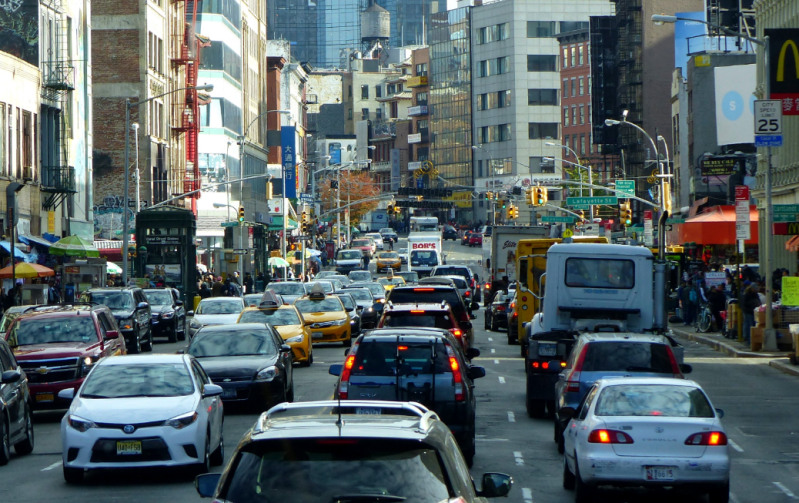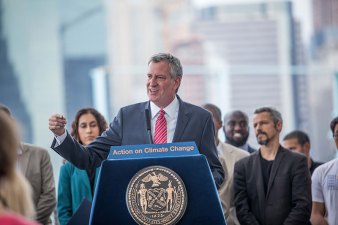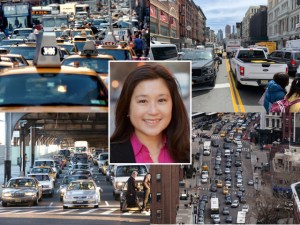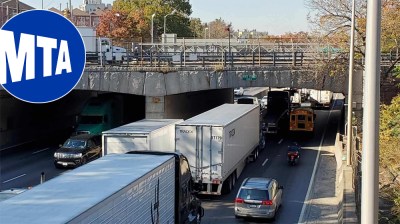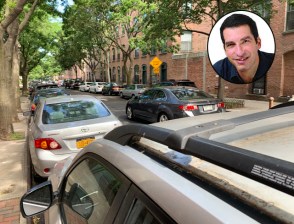Op-Ed: Another Reason to Support Congestion Pricing? Cleaner Air

As a mom living in Washington Heights, I care passionately about clean air for New Yorkers, old and young. I’m constantly reporting buildings that violate clean air laws by spewing out black smoke all over the neighborhood.
But buildings are far from the only source of damaging air pollution. Just look to the roads and the rails: Transportation makes up nearly a third of New York City’s greenhouse gas emissions. Cars and traffic, fueled by diesel and gasoline, are largely to blame.
The city’s congestion has big consequences for our little ones, whose still-developing lungs are more vulnerable to asthma and other damage. Asthma has been sending New York City’s youngest inhabitants – our kids 4 years old and younger – to the ER at a rate nearly 50 percent higher than the state average.
Fortunately, there’s a step New York can take right away to help lower pollution from vehicles: put in place a toll around the most traffic-choked part of the city. The idea, referred to as congestion pricing, would raise money for much-needed improvements to our public transit system, as well as for transitioning the city’s buses to an all-electric fleet.
Fewer cars on the road, more people on the subways and a cleaner bus system would be a win, win, win for our lungs.
We already know congestion pricing can work to reduce pollution and children’s hospitalization from asthma. The city of Stockholm implemented congestion pricing in 2007, and a recent study suggests that reductions in air pollution from traffic decreased hospital visits for acute asthma by up to 15 percent. The study also notes that these short-term findings don’t begin to capture the long-term health benefits from a cleaner transportation sector.
Healthier air is atop my list of reasons to support congestion pricing, but it’s not the only benefit for New York families.
By lowering the number of cars on the road, congestion pricing would also reduce deaths and injuries from car crashes, according to Transportation Alternatives. For example, congestion pricing has helped make London’s streets safer for all – one study found the number of crashes dropped by 40 percent after it was implemented.
Traffic fatalities are especially threatening for kids. According to the mayor’s office, being struck by a vehicle is the leading cause of injury-related death for children under the age of 14. Congestion pricing could protect our streets and families, and help Mayor de Blasio reach his goal to make New York the world’s safest big city.
Furthermore, congestion pricing can help improve public transit accessibility. Any parent who has traversed the subway with a stroller knows how bad the situation is. In fact, according to a group of disability organizations, the New York City subway is one of the least accessible public transportation systems in the country. Of the city’s nearly 500 subway stations, only about about a quarter are wheelchair accessible.
The MTA recently hired its first-ever accessibility chief, a great sign that the needs of children with disabilities will be a bigger part of the transit conversation going forward. Yet the improvements that so many people are waiting on require funding, and lots of it. Money from congestion pricing can help pay for accessibility enhancements like new electric lifts and elevators and signage for people with hearing impairments.
I support congestion pricing because it is a big vision for big results. Our city deserves a clean public transit system that our families can rely on — with less pollution, fewer traffic fatalities and greater accessibility for all. Contact your legislator today.
Dominique Browning is senior director and co-founder of Moms Clean Air Force. She is also the author of Around the House and In the Garden: a Memoir of Heartbreak, Healing, and Home Improvement; Paths of Desire: the Passion of a Suburban Gardener; and Slow Love: How I Lost my Job, Put on My Pajamas, and Found Happiness.
